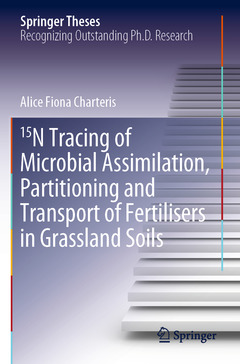Description
15N Tracing of Microbial Assimilation, Partitioning and Transport of Fertilisers in Grassland Soils, 1st ed. 2019
Springer Theses Series
Author: Charteris Alice Fiona
Language: English
Subjects for 15N Tracing of Microbial Assimilation, Partitioning and...:
Publication date: 11-2020
261 p. · 15.5x23.5 cm · Paperback
Approximative price 105.49 €
In Print (Delivery period: 15 days).
Add to cartPublication date: 11-2019
261 p. · 15.5x23.5 cm · Hardback
Description
/li>Contents
/li>Biography
/li>Comment
/li>
This book presents innovative research on soil nitrogen cycling and nitrate leaching with a view to improving soil management and fertiliser nitrogen use efficiency and reducing nitrogen leaching losses. In this regard, nitrogen-15 (15N)-labelled fertiliser was used as a biochemical and physical stable isotope tracer in laboratory and field experiments. The major outcome of the research was the development, validation and application of a new compound-specific amino acid 15N stable isotope probing method for assessing the assimilation of fertiliser nitrogen by soil microbial biomass.
The novelty of the method lies in its tracing of incorporated nitrogen into newly biosynthesised microbial protein in time-course experiments using gas chromatography-combustion-isotope ratio mass spectrometry. The approach provides previously unattainable insights into the microbial processing of different nitrogen fertilisers in different soils. Further, it identifies the mechanistic link between molecular-scale processes and observations of field-scale fertiliser nitrogen immobilisation studies. The method and the results presented here will have far-reaching implications for the development of enhanced recommendations concerning farm-based soil management practices for increasing soil productivity and reducing nitrogen losses, which is essential to minimising environmental impacts.Introduction.- Sites, sampling, materials and methods.- Compound-specific amino acid 15N stable isotope probing of nitrogen assimilation by the soil microbial biomass using gas chromatography-combustion- isotope ratio mass spectrometry.- Biosynthetic routing, rates and extents of microbial fertiliser nitrogen assimilation in two grazed grassland soils.- Microbial fertiliser nitrogen assimilation in the field as compared with the laboratory incubation experiments.- 15N tracing of the partitioning and transport of nitrate under field conditions.- Overview and future work.

